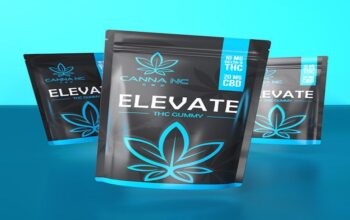THCP is an organic cannabinoid (or phytocannabinoid) similar to delta 9 THC, which is the rich cannabinoid in the majority of the strain of marijuana. Although first understood in certain marijuana strains, THCP can be made in a laboratory by chemically manipulating CBD extracted from legal hemp plants.
To produce enough THC-P to have any real industrial worth, it has to be made in a lab, since there’s simply not enough of it in cannabis flower to produce the premium extract.
THCP’s molecular structure is considerably different from delta 9’s. It has a much longer alkyl side chain (the “tail” of atoms that extends out from the bottom of the biggest part of the particle). The extra-large side chain– seven carbon atoms against five in delta 9– allows THCP to bind more readily with human CB1 and CB2 cannabinoid receptors, which means its effects are likely to be more potent in the mind and body.
Does Thc-P Get You High?
The Italian researchers discovered organic THC-P found in experiments on cultured human cells that THCP binds 33 times better with the CB1 receptor than delta 9 THC– probably because of its prolonged seven-atom side chain. The CB1 receptor is the most important cannabinoid receptor for creating psychedelic effects, but THCP also binds quicker with the CB2 receptor.
That doesn’t mean that THCP will get you 33 times higher than traditional delta 9. There is probably a limit to any cannabinoid’s capacity to boost the endocannabinoid receptors, and everyone reacts differently to every cannabinoid anyhow. But while a few of THC-P’s 33x greater binding fondness may be squandered on already-overloaded cannabinoid receptors, it still seems likely that THCP will be more potent than delta 9 THC for many people. It might get you extremely high.
What Are the Effects of Thc-P?
Because THCP binds so well with cannabinoid receptors, it’s likely to produce effects similar to those of delta 9 THC yet probably more noticeable. The scientists that found THCP performed common cannabis mice experiments to determine the new cannabinoid’s physical effects. Mice showed low levels of activity at low doses, which became catalepsy– a trance-like state– at higher doses. THCP appeared to work as an effective pain medication at higher doses as well.
The ability of THCP to bind so efficiently with cannabinoid receptors in the body can make it extremely beneficial– not equally as a recreational high, but also to soothe pain, ease nausea or vomiting, and help individuals sleep. Although THCP hasn’t been extensively researched yet, it promises that this cannabinoid’s unparalleled binding affinity with human receptors will make it particularly important for dealing with those and various other problems.
Trace amounts of THC-P in existing marijuana strains may be responsible for a few of cannabis’ recognized therapeutic properties. The researchers that found THCP in 2019 created that “the discovery of an extremely potent THC-like phytocannabinoid might clarify numerous pharmacological effects not ascribable exclusively to [delta 9 THC] in marijuana.
THCP FOR SALE products are readily available on D8austin.com and market various other hemp-derived cannabinoid products. They’re also marketed in head stores, corner stores, gas stations, and some vape stores.

